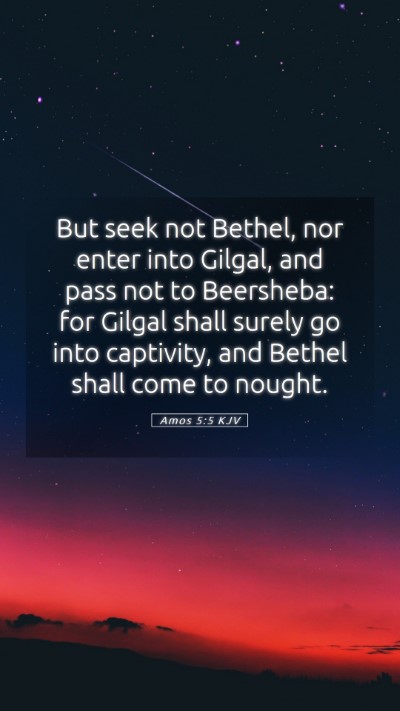Old Testament
Genesis Exodus Leviticus Numbers Deuteronomy Joshua Judges Ruth 1 Samuel 2 Samuel 1 Kings 2 Kings 1 Chronicles 2 Chronicles Ezra Nehemiah Esther Job Psalms Proverbs Ecclesiastes Song of Solomon Isaiah Jeremiah Lamentations Ezekiel Daniel Hosea Joel Amos Obadiah Jonah Micah Nahum Habakkuk Zephaniah Haggai Zechariah MalachiAmos 5:5 Meaning
What is the meaning of Amos 5:5?
But seek not Bethel, nor enter into Gilgal, and pass not to Beersheba: for Gilgal shall surely go into captivity, and Bethel shall come to nought.
Amos 5:5 Bible Verse Meaning
Understanding Amos 5:5
Amos 5:5 states: "But seek not Bethel, nor enter into Gilgal, and pass not to Beer-sheba; for Gilgal shall surely go into captivity, and Bethel shall come to nought."
This verse presents a clear message from the prophet Amos, conveying a warning to the people of Israel about their reliance on these significant places of worship. Below is a summarization of insights drawn from public domain commentaries.
Analysis and Interpretation
The primary thrust of Amos 5:5 can be categorized into several key themes:
- Condemnation of Idolatrous Worship: The places mentioned—Bethel, Gilgal, and Beer-sheba—were significant centers for worship and sacrifice. However, they had become associated with idolatrous practices. Matthew Henry emphasizes that the Israelites were seeking God in these places while neglecting true repentance and righteousness.
- Warning of Impending Judgment: Amos is foretelling the downfall of these sites, indicating that, soon, they would be rendered ineffective and relics of a past faith. Albert Barnes underscores that the prophecy assures that these places, despite their historical importance, would not save the people from the coming catastrophe.
- The Importance of True Worship: The verse suggests a need for genuine worship as opposed to ritualistic practices. Adam Clarke points out that the people are advised against relying on mere ceremonial acts performed in these locations without true faith and ethical living.
Theological Implications
Amos 5:5 raises several theological points relevant to understanding Scripture:
- God's Sovereignty: The verse illuminates the idea that God’s judgment can affect even the most revered religious sites. It teaches that no place can serve as a refuge from divine retribution if the people are not aligned with God's will.
- Call for Sincerity: The call to “seek the Lord” is not merely about physical locations but a heartfelt pursuit of righteousness, justice, and truth. This is echoed in various biblical teachings that emphasize a relationship with God over ritualistic acts.
Cross References
This verse relates to several other passages that reflect similar themes:
- Hosea 4:15: A reiteration of the unfaithfulness of Israel and the futility of their worship practices.
- Isaiah 1:11-13: God’s disdain for meaningless rituals when the heart is distant from Him.
- Micah 6:6-8: A challenge regarding what God truly desires from His people: justice, mercy, and humility.
Conclusion
In summary, Amos 5:5 serves as a heartfelt warning to not only the Israelites of Amos's time but also to contemporary believers. It encourages a deep reflection on the authenticity of one’s worship and relationship with God. Understanding this verse calls for an exploration of the broader context of worship in both the Old and New Testaments, underscoring the eternal truths regarding God's character and expectations of His followers.
By delving into resources such as Bible study guides and online Bible study tools, individuals can foster a deeper understanding of Scripture and apply these lessons to their daily lives. This passage invites readers to consider how genuine expressions of faith manifest in their actions and rituals and to pursue a heart-centered devotion to God.


